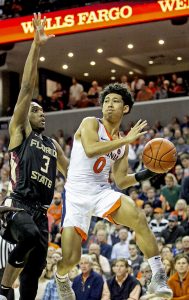Pesky Clark stepping up his game in ACC play
By Jerry Ratcliffe

UVA’s Kihei Clark elevates as he deals with tight defense by FSU’s Trent Forrest.
Kihei Clark knew he had arrived as a major college basketball player during a pickup game with his Virginia teammates last summer in Charlottesville.
At 5-foot-9, Clark is not an imposing figure, not until he gets in your face, smothers you with his defensive blanket, handcuffs your ability to move, frustrates you to the point where you just want to throw something at him.
The freshman from California was locked in basketball combat with veteran teammate Ty Jerome, one of the ACC’s most lethal shooters and a pretty nifty point guard himself. Clark’s job was to just pester the hell out of Jerome.
Virginia fans saw something similar a few nights ago when Clark’s assignment was to do the same against Virginia Tech’s senior point guard Justin Robinson.
“My job is to pester the ball and disrupt their offense, and if [Tech’s] point guard is doing that, then I’m doing something right,” Clark said after UVa annihilated Tech.
In the process, Clark’s defense played a major factor in Robinson shooting 2 for 7 (1 for 5 from beyond the arc) for 9 points (he hit all four free throw attempts). Coming into the game, Robinson averaged 13 points per game, but has always been considered a dangerous scorer who was shooting close to 50 percent, and led the ACC in assists. He had only two against UVA.
When Clark mentioned that Robinson “is doing that,” he was referring to Robinson losing his cool and pushing the ball so hard into Clark’s stomach that the Hokies’ point guard was called for a technical foul.
Clark had clearly taken up residence inside Robinson’s head.
“Him pushing me with the ball, that was a statement,” Clark said. “I was just doing my job trying to guard him the best I could.”
Frustrating other guards is nothing new for Clark, nor is drawing the ire of his opponent, or even his own teammates in practice.
“I think the most recent time [that happened] was Ty (Jerome) in the summer, but that just goes to show that pressuring the ball and pestering guys can get in people’s heads,” Clark said.
The story goes that Jerome was so frustrated with Clark getting into his head, his face, and possibly his jock strap with smothering defense, that Jerome threw the ball … at Clark’s head.
“Yeah,” Clark confirmed with a canary-chomping-Cheshire cat grin. “No, I didn’t manage to get out of the way.”
Clark was feeling his oats after getting a restrictive splint off his left wrist, which allowed him to be himself on both ends of the floor. Instead of the splint, his wrist was taped.
“It was good to get the splint off his wrist and the cast,” Coach Tony Bennett said. “He had tape and he had more mobility. He’s going to say, ‘That’s all I needed, Coach.’
“Banging those threes (Clark hit all three of his shots, a career record, from behind the arc for a career-high 9 points) was huge,” Bennett continued. “But his job against [Robinson], one of the better guards in our league without a doubt …” Bennett didn’t complete his sentence. He didn’t have to. Everyone saw what a lockdown Clark had executed against the Tech guard.
“I’ve watched [Clark’s] game evolve over four years and Kihei, he’s just got something inside of him,” the Virginia coach added. “Those of you who’ve watched us can see that. He won’t back down, he’s quick and he’s got a low center of gravity, and that bodes well and he just made [Robinson] earn most of the night.”
Clark wasn’t the only one excited about the splint removal. Teammate Kyle Guy pointed out that Bennett had mentioned it about a dozen times in the practice the day before the game.
“How does it feel?,” Guy mimicked Bennett from that practice session. “I think [Clark] felt a lot more comfortable and he was shooting with confidence.”
Clark confirmed that, too, noting that the splint had affected his shooting “a little bit,” but he just kept shooting.
“I knew they were going to fall. I knew I had put in the work, so I was just going to keep shooting,” the freshman said.
Could it be that in Virginia’s showdown against Duke on Saturday night, that Clark could have the most impact of any Wahoo on the floor?
Certainly it’s a huge game for both teams. Duke is ranked No. 1 in the AP poll, having lost earlier this week at home to Syracuse, and Virginia is ranked No. 1 in the coaches’ poll. This will mark the first time in ACC history that the two No. 1 teams in the respective polls have faced off, and only the fourth time in college basketball history.
With Duke losing its freshman point guard, Tre Jones, to a shoulder injury in that Syracuse game, Jones’ status is somewhat in question for Saturday. While the initial prognosis didn’t look promising and Blue Devils officials said the guard would be out “indefinitely,” they have since revised their opinion and stated he may return sooner than anyone expected.
Still, most don’t expect Jones to play against Virginia. It could be a game-time decision according to some reports out of Durham.
Jones does for Duke what Clark does for UVA. He’s a disrupter with his on-ball pressure, forces turnovers that often lead to Zion Williamson dunks. Of all the players on Duke’s roster it couldn’t truly replace, it was Jones.
Depending on who Coach Mike Krzyzewski puts in that spot, they will likely face the full pressure of Clark, and that could be a problem for the Blue Devils. In addition, UVA’s guards shouldn’t receive the same kind of pressure that Jones would have brought to the table.
“Whoever plays, plays,” Clark said. “It doesn’t matter who’s out there. I’m going to go out and do my job.”
Who knows what Coach K may come up with. Some have suggested that he could start RJ Barrett at the point, which he played some in a few preseason exhibition games in Canada over the summer. There’s a risk if he moves to the point, that it could take away from his scoring potential.
Others think Cam Reddish is more logical, although at 6-9, that would be a physical mismatch with Clark, a foot shorter. Reddish is a good ball handler, but sometimes makes bad decisions.
Then there’s reserve guard Jordan Goldwire, who is a decent on-ball defender himself, but he has clearly been a backup.
Barrett took over at the point after Jones was injured against Syracuse and scored 20 points to go with nine assists and 16 rebounds, close to a triple-double. Certainly that’s more than serviceable, but he’s been a more lethal scorer at another position.
Whatever the case, whoever might trot out to center court at Cameron, Clark will be ready to make it a long night for someone.
Hopefully next time he’ll remember to duck.








